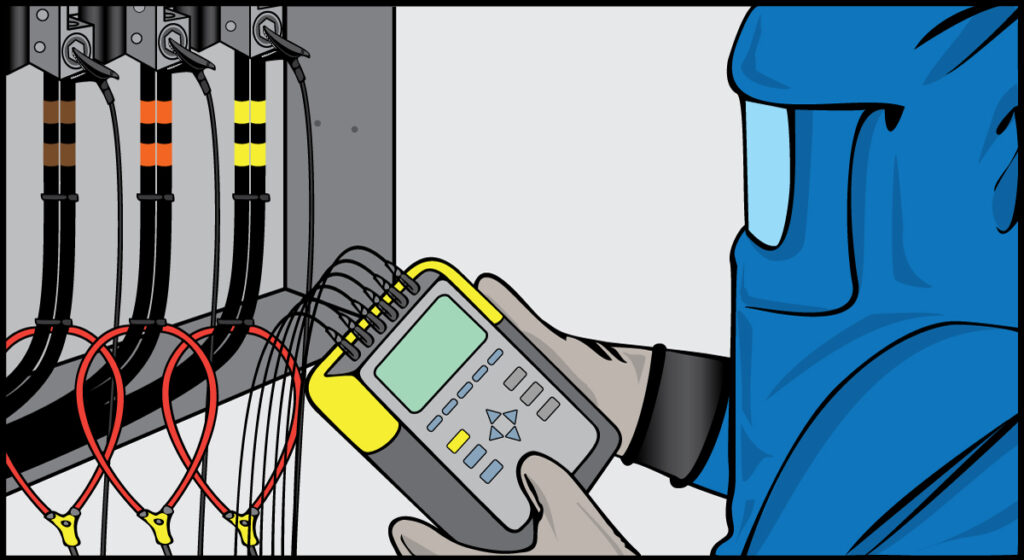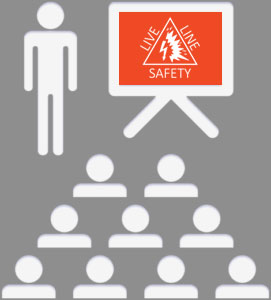ELECTRICAL SAFETY TRAINING
Employees shall be trained in and familiar with the safety-related work practices required by 1910.331 through 1910.335 that pertain to their respective job assignments.
ELECTRICAL SAFETY AWARENESS
Live Line Electrical Safety Services provides specialized services that include dielectric PPE testing, vehicle inspections + dielectric testing, PPE product sales and Electrical Safety Training. For anything in relation to Electrical Safety, call Live Line Electrical Safety Services. Safety subject matter experts in Electrical Safety.
Our approach is simple. We’re not trying to show you how to build a watch, we’re showing you how to tell time. While the details of how an arc flash event occurs is impressive + important, we focus on the employee’s needs. Long words, technical studies and complex sentences? The audience won’t understand and the result is no results. With brevity and clarity we reveal OSHA 1910.331-335 regulations + NFPA 70E standards in its simplest form. Short + concise.
WHY CHOOSE LIVE LINE SAFETY
I’ve seen great instructors who are able to get the class to engage in the training and also the complete opposite unfortunately. I feel that he falls into the great instructor category and that was on a Zoom call versus in person, which is a challenge in itself! I enjoyed the course.
Live Line Electrical Safety Services specializes in Electrical Safety Training, Electrical PPE Product Sales and Dielectric Testing of Electrical Personal Protective Equipment [PPE] per OSHA requirements meeting and exceeding industry standards.
EDUCATE ALL TO ELEVATE SAFETY
Our instructional classes are known to others by many names:
Live Line Electrical Safety Awareness classes in fact cover all of these.
Why? OSHA specifically mandates employer assessment of generally recognized hazards in the workplace and provisions for protecting the employee from those hazards. We cover OSHA 29 CFR 1910.331-335 regulations and reference our nation’s most popular standard as the “best practice” for electrical safety, NFPA 70E. NFPA 70E describes the safe work practices for electrical construction and maintenance but not how to design or install electrical systems. The purpose of this awareness class is to explain the safety precautions these employees must always take to avoid needless tragedies while performing any type of electrical work.
WHO SHOULD COMPLETE ARC FLASH ELECTRICAL SAFETY TRAINING?
Well here lies one of the biggest misconceptions about Electrical Safety Training. Most people think “Electrical” Safety Training is for Electricians. Wrong! Electrical Safety Training is for anyone who may be exposed to electrical hazards over as little as 50 volts AC (100 volts DC), Qualified AND Unqualified.
OSHA 29 CFR 1910.331(a) – Covered work by both qualified and unqualified persons. The provisions of §§1910.331 through 1910.335 cover electrical safety-related work practices for both qualified persons (those who have training in avoiding the electrical hazards of working on or near exposed energized parts) and unqualified persons (those with little or no such training)…
The training has to include electrical hazard awareness, procedures and requirements needed to avoid the hazards, understand the relationship between electrical hazards and the injuries that may be caused by those hazards. The employer must ensure the training is site-specific and covers the actual hazards the workers may encounter.
WHY YOU SHOULD COMPLETE ARC FLASH ELECTRICAL SAFETY TRAINING?
Because of the dangers such as Arc Flashes, Arc Blasts, and Electric Shock, a moment’s inattention, a simple mistake or faulty equipment when working near or on electrical systems can be fatal. And while electrical hazards are not the leading cause of workplace injuries and accidents, they are disproportionately fatal and costly.
Something to remember:
OSHA = “Shall”, NFPA = “How”

SHALL
OSHA 1910.332(a) states that employees who face a risk of electric shock operating on electric circuit parts operating at 50 volts AC (100 volts DC) must be trained and any other employees who also may reasonably be expected to face a comparable risk must also be trained. OSHA 1910.332(b)(1) states employees shall be trained in and familiar with the safety-related work practices required by 1910.331 through 1910.335 that pertain to their respective job assignments.
HOW
NFPA 110.2(A) Electrical Safety Training. The training requirements contained in this section shall apply to employees exposed to an electrical hazard when the risk associated with that hazard is not reduced to a safe level by the applicable electrical installation requirements. Such employees shall be trained to understand the specific hazards associated with electrical energy. They shall be trained in safety-related work practices and procedural requirements, as necessary, to provide protection from the electrical hazards associated with their respective job or task assignments. Employees shall be trained to identify and understand the relationship between electrical hazards and possible injury.
WHAT WILL YOU LEARN IN ELECTRICAL SAFETY AWARENESS CLASS?
This course teaches awareness on the mandated requirements of OSHA 1910.331(a): Covered work by both qualified and unqualified persons. The provisions of 1910.331 through 1910.335 cover electrical safety work practices for both qualified persons and unqualified persons working on, near, or with electricity. The Arc Flash Electrical Safety Training will reference the NFPA 70E standards. The following are topics covered in our class:
RESULTS OF THE ARC FLASH ELECTRICAL SAFETY TRAINING?
Key lessons learned by the qualified or unqualified worker are to recognize the regulations set forth in OSHA 29 CFR Part 1910, Subpart S Electrical and to implement the standards in NFPA 70E “Standard for Electrical Safety in the Workplace”. In the Arc Flash Electrical Safety Training the qualified or unqualified worker will have learned how to perform safe electrical work practices, understand shock protection hazards & boundaries, understand arc flash hazards & boundaries, and proper PPE selection based on incident energy analysis or the PPE category method. Upon completion a certificate and wallet card are issued to each individual who passes the class.
Live Line Electrical Safety Services’ goal is to help ensure that workers are more knowledgeable about workplace hazards and their rights, contribute to our nation’s productivity and to return home safely to their family’s every day.
Overall, encourage your employees to perform the work in a verified de-energized state — referred to as “creating an electrically safe work condition (ESWC)” in NFPA 70E, unless energized work can be justified.
CONTACT US FOR MORE INFORMATION ON YOUR PERSONALIZED TRAINING
FREE QUOTE
Call for available schedule to perform Off-site Dielectric Field Testing and NFPA 70E Electrical Safety Training in the Houston area.

